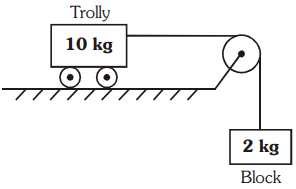Calculate the acceleration of the block and trolly system shown in the figure. The coefficient of kinetic friction between the trolly and the surface is 0.05. (g = 10 m/, the mass of the string is negligible and no other friction exists).

(1) 1.25 m/
(2) 1.50 m/
(3) 1.66 m/
(4) 1.00 m/

A rocket with a lift-off mass of \(20,000\) \(\mathrm{kg}\) is blasted upwards with an initial acceleration of \(5~\mathrm{ms}^{-2}\). Then initial thrust (force) of the blast is:
(Take \(g=10\) \(\mathrm{ms}^{-2}\))
1. \(7 \times 10^5 \mathrm{~N} \)
2. \(0 \)
3. \(2 \times 10^5 \mathrm{~N} \)
4. \(3 \times 10^5 \mathrm{~N}\)
Two masses \(8~\text{kg}\) and \(12~\text{kg}\) are connected at the two ends of a light inextensible string that goes over a frictionless pulley. The acceleration of the masses and the tension in the string when the masses are released are:
1. \(2~\text{ms}^{-2}, 69~\text{N}\)
2. \(1~\text{ms}^{-2}, 69~\text{N}\)
3. \(2~\text{ms}^{-2}, 96~\text{N}\)
4. \(1~\text{ms}^{-2}, 96~\text{N}\)
A batsman deflects a ball of mass 0.15 kg by an angle of 45° without changing its initial speed which is equal to 54 km/h. Then impulse imparted to the ball is:
1. \(5.2~\mathrm{kgms}^{-1}\)
2. \(3.2~\mathrm{kgms}^{-1}\)
3. \(2.2~\mathrm{kgms}^{-1}\)
4. \(4.2~ \mathrm{kgms}^{-1}\)
The figure shows the position-time graph of a body of mass \(0.04~\text{kg}\). Then the magnitude of each impulse is:
1. \(8 \times 10^{-4} ~\text{kg-ms}^{-1}\)
2. \(8 \times 10^{-3} ~\text{kg-ms}^{-1}\)
3. \(4 \times 10^{-4} ~\text{kg-ms}^{-1}\)
4. \(4 \times 10^{-3} ~\text{kg-ms}^{-1}\)
A constant retarding force of \(50~\text N\) is applied to a body of mass \(20~\text{kg}\) moving initially with a speed of \(15~\text{m/s}.\) How long does the body take to stop?
1. \(6~\text{sec}\)
2. \(5~\text{sec}\)
3. \(7~\text{sec}\)
4. \(4~\text{sec}\)
A constant force acting on a body of mass \(3.0\) kg changes its speed from \(2.0\) m/s to \(3.5\) m/s in \(25\) s. The direction of the motion of the body remains unchanged. What is the magnitude and direction of the force?
| 1. | \(0.18\) N opposite to the direction of motion. |
| 2. | \(0.18\) N along the direction of motion. |
| 3. | \(0.16\) N along the direction of motion. |
| 4. | \(0.16\) N opposite to the direction of motion. |
A body of mass \(5~\text{kg}\) is acted upon by two perpendicular forces, \(8~\text N\) and \(6~\text N.\) The magnitude of the acceleration of the body is:
1. \(0.99~\text{ms}^{-2}\)
2. \(3~\text{ms}^{-2}\)
3. \(2~\text{ms}^{-2}\)
4. \(0.77~\text{ms}^{-2}\)
The driver of a three-wheeler moving with a speed of \(36~\text{km/h}\) sees a child standing in the middle of the road and brings his vehicle to rest in \(4.0~\text{s}\) just in time to save the child. What is the average retarding force on the vehicle?
(The mass of the three-wheeler is \(400~\text{kg}\) and the mass of the driver is \(65~\text{kg}\).)
1. \(7.1 \times 10^4 ~\text{N}\)
2. \(2.1 \times 10^4 ~\text{N}\)
3. \(1.7 \times 10^3 ~\text{N}\)
4. \(1.2 \times 10^3 ~\text{N}\)
A bob of mass 0.1 kg hung from the ceiling of a room by a string 2 m long is set into oscillations. The speed of the bob at its mean position is . What is the trajectory of the bob if the string is cut when the bob is at its mean position?
1. Parabolic path
2. elliptical path
3. circular path
4. Straight-line path







